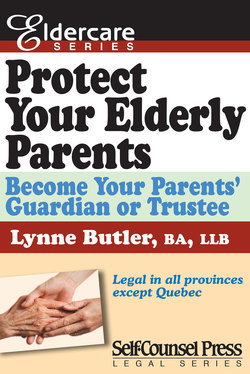Читать книгу Protect Your Elderly Parents - Lynne Butler - Страница 21
На сайте Литреса книга снята с продажи.
4.1 The best medical evidence
ОглавлениеWhen obtaining any doctor’s, nurse’s, or psychologist’s report it is best to try to get the report from a professional who has known the dependent adult for some time or who is currently treating the dependent adult. This is because you want to get the most accurate report possible — one that will neither exaggerate the dependent adult’s problems nor minimize them. A lot of people will be relying on these reports for many years and accuracy is essential. An elderly relative that is taken, perhaps unwillingly, to a stranger for examination will feel stress, apprehension, and possibly even disorientation. He or she will therefore not be functioning at his or her best and the doctor may get a false picture of the patient’s condition. This simply is not fair to the dependent adult and you should make every effort to involve a doctor with whom the dependent adult is already familiar.
In addition, in a short visit a doctor may make an assessment based on an unfamiliar patient’s performance without being made aware that the patient normally uses a hearing aid, wears glasses, or relies on a language interpreter. Again, in this situation the doctor may be presented with a less than accurate picture of the patient’s ability to function and as a result the report issued by the doctor will be flawed.
In many larger centres in Canada, there are doctors available who specialize in geriatrics (i.e., health care for older people). Large cities generally have entire hospitals or hospital departments devoted to the care of older people. You should consider this kind of doctor if one is available to you. To find out whether there is a geriatric specialist in or near your town, you could ask your family doctor, call a major hospital nearby, or contact a local group concerned with elder issues, such as groups that assist families to deal with Alzheimer’s disease or a seniors’ advocacy group.
